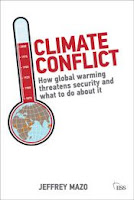Imagine this: sometime in the next 10–15 years, a tide of refugees heading north from Mexico prompts the US military to seal the border. With an increasing proportion of the US population of Hispanic origin, negative publicity from the 24-hour news cycle and online media such as YouTube leads to 'the greatest social division since the Civil War'. This is just one of the dire scenarios that might arise from climate change set out by journalist and author Gwynne Dyer at a discussion meeting at the IISS in London on 4 November.
His remarks, based on his book Climate Wars, painted a bleak picture of a future where water shortages and crop failures lead to mass migration, state failure – 'Somalia × 20' in Africa and the Middle East – and wars between countries that share river systems already stretched to the breaking point.
If Iraq had a 'real army', Dyer said, it would already be at war with Turkey over the latter's dams on the headwaters of the Euphrates. In South Asia, we can look forward to 20 years of summer flooding followed by excessively dry summers in the Indus watershed as the Himalayan glaciers disappear. War – possibly nuclear – over water was likely between India and Pakistan within the next 25 years.
Dyer's scenarios are far more pessimistic than anything I discuss in my own Climate Conflict, published in the IISS Adelphi series earlier this year. This is principally because he is looking at worst cases in terms of projections of emissions and their climate impacts, whereas I deliberately chose to take a more conservative approach. I considered a world where, in the next two or three decades, the climate impacts of global warming are of a magnitude similar to the normal background variation.
I have no doubt that unmitigated climate change will eventually lead to the types of consequences, if not the exact scenarios, Dyer foresees. The question is how soon we can expect them – in 20 years, in 50 years, in 100 years. The scientific uncertainty is quite high and it would be rash to take either version as gospel.
His remarks, based on his book Climate Wars, painted a bleak picture of a future where water shortages and crop failures lead to mass migration, state failure – 'Somalia × 20' in Africa and the Middle East – and wars between countries that share river systems already stretched to the breaking point.
If Iraq had a 'real army', Dyer said, it would already be at war with Turkey over the latter's dams on the headwaters of the Euphrates. In South Asia, we can look forward to 20 years of summer flooding followed by excessively dry summers in the Indus watershed as the Himalayan glaciers disappear. War – possibly nuclear – over water was likely between India and Pakistan within the next 25 years.
Dyer's scenarios are far more pessimistic than anything I discuss in my own Climate Conflict, published in the IISS Adelphi series earlier this year. This is principally because he is looking at worst cases in terms of projections of emissions and their climate impacts, whereas I deliberately chose to take a more conservative approach. I considered a world where, in the next two or three decades, the climate impacts of global warming are of a magnitude similar to the normal background variation.
I have no doubt that unmitigated climate change will eventually lead to the types of consequences, if not the exact scenarios, Dyer foresees. The question is how soon we can expect them – in 20 years, in 50 years, in 100 years. The scientific uncertainty is quite high and it would be rash to take either version as gospel.


As always, Greg Craven's discussion of risk management comes to mind...
ReplyDelete